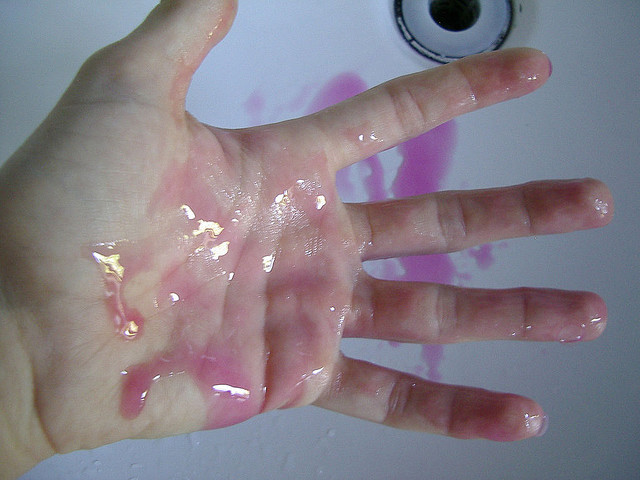Something To Think About At The Sink: What's In The Soap?
By JoshMogerman in News on Feb 10, 2013 10:00PM
Experts say that the worst of the influenza season is probably passed now, but the full-on flu freakout probably still has you reaching for stuff to keep the bugs at bay. “Wash your hands,” has been the mantra during this year’s outbreak, but some of the antibacterial products we are slathering on to avoid the season’s sickness might not work as well as advertised. And worse, they could be opening the door to much bigger problems.
Take triclosan. The Trib’s excellent food and consumer issues writer Monica Eng has an article today digging deep into a controversial ingredient common to antibacterial soap that will have you thinking next time you are lathering up:
But some scientists are increasingly concerned that a common anti-bacterial ingredient called triclosan may harm people's health. Laboratory studies have found that it may disrupt hormones, interfere with muscle function and promote the growth of stronger bacteria — and other research suggests it is building up in the environment to the possible peril of wildlife.University of Michigan studies pointing to the chemical being “no more effective than plain soap at preventing infectious illness symptoms and reducing bacterial levels on the hands," seem to back up that comment, as the researchers noted hand washing is more about knocking bacteria off of your hands than killing it. That has not slowed adoption of the chemical; the Trib story notes federal research showing traces of triclosan in the urine of 75% of Americans. That is troubling, as lab studies on mice and rats showed hormonal changes and impaired muscle function associated with the chemical. Further concerns about overuse of the chemical creating antibacterial resistant “superbugs” have dogged triclosan, contributing to the decision by one major hospital group to stop using products containing triclosan.What's more, there is no evidence that hand-washing with soap containing triclosan or other anti-microbial ingredients offers any health advantages over regular soap and water, according to advisory committees for the American Medical Association and the U.S. Food and Drug Administration.
"Triclosan is what we call a stupid use of a chemical," said Dr. Sarah Janssen, a physician and senior scientist with the Natural Resources Defense Council, an environmental advocacy group. "It doesn't work, it's not safe and it is not being regulated."
The US Food and Drug Administration has oversight of the chemical. Last month the Minneapolis Star Tribune called the regulator’s slow movement to address concerns, “inexcusable dallying.” And Minnesotans have extra reason to pay close attention after a recent study showed triclosan present in lakes all around the state (including Lake Superior). The newspaper also noted:
The Food and Drug Administration (FDA) said that there is not enough evidence to recommend limiting its use, but that it is studying its health effects. In addition, the Environmental Protection Agency is investigating whether exposure to chlorine in the wastewater treatment process transforms triclosan into compounds called dioxins that can accumulate in the natural food chain, causing cancer, deformities and other problems in fish, frogs and other animals.Given the widespread use of the chemical, Minnesota’s lakes are probably not unique. We would be interested to see what pops up in Lake Michigan…
The Chicago Tribune has been on the war path over excessive chemical usage in consumer products of late, as witnessed by their ongoing, unsettling (and award winning) coverage of flame retardants. We say bravo to the muckraking, as we look through our medicine cabinets…
